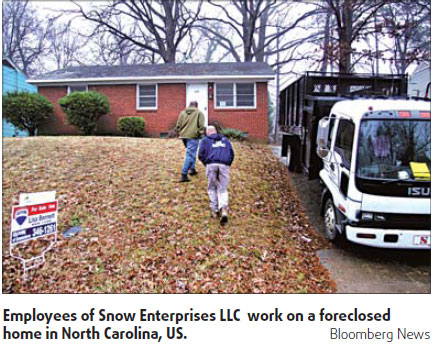
|
WORLD> America
 |
|
2nd US financial crisis brewing - experts
By Xin Zhiming (China Daily)
Updated: 2009-02-24 11:42 A second round of mortgage defaults - even more powerful than the sub-prime woes - will hit the US economy and lead to more bank closures and a prolonged recession, economists have warned.
 It would deal a heavy blow to Chinese holdings of dollar assets and the country needs to take pre-emptive measures to ward off such risks, they have suggested.
As more loan defaults in the fields of Alt-A and option ARM mortgages, as well as in credit cards are surfacing in the US, its major commercial banks would face much heavier pressure and some of them may end up being nationalized, said Song Hongbing, head of the newly established Global Business and Finance Institute (GBFR) in Beijing. A recent Credit Suisse report has revealed that a potential $1 trillion of the so-called Alt-A and Option ARM mortgages would have their interest rates reset through 2011. These were loans extended under loosened standards to encourage house sales in the US during recent years. It means a large number of home owners would not be able to afford the new interest rates and would default on their loans. "Worse, while commercial banks are facing a major crisis, the hedge funds will also be trapped in dire difficulties," said Zhang Ming, economist with the Institute of Finance and Bank at the Chinese Academy of Social Sciences. Hedge funds manage about $1.5 trillion globally, but since last November, there have been obvious signs of investors withdrawing their money, Zhang said at the inauguration of the GBFR on Sunday. "In November, the withdrawal was about $40 billion while it jumped to about $120 billion the next month." The corporate bond market, whose scale amounts to $2.2 trillion in the US, will also face the danger of mass defaults, Wang Zili, a researcher at the graduate school of the People's Bank of China, wrote in a Feb 17 article. Several major companies like cable TV firm Charter Communications, have filed for bankruptcy. Standard & Poor's has estimated that about 90 percent of the 263 media and entertainment companies surveyed are potential debt defaulters. Another fuse that would trigger the second round of defaults is the credit card sector, which has nearly $1 trillion in unpaid loans in the US, warned Wang. China faces danger from a potential second financial crisis in the US as its $1.95 trillion in foreign exchange reserves may shrink in value, analysts said. As the US is unleashing huge amounts of liquidity into the financial system and is expected to issue more treasuries, the rate of inflation may surge and the dollar may slump in future, leading to a contraction in China's dollar assets. "More than $1.3 trillion out of its foreign exchange reserves are dollar assets," said Zhang Ming. China must diversify its use of the reserves, buying more commodities such as oil when prices are relatively lower, he said. |
||||||||